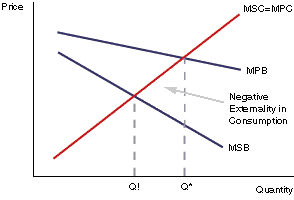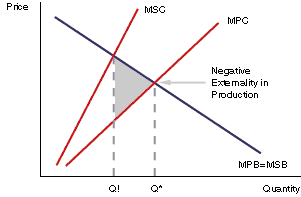Summary
This article (Dehghan 2010) explains the effects of pollution on Tehran and why sanctions are imposed by US government. Tehran is overpopulated and since the major mode of transport is by road a lot of carbon dioxide is emitted into the air hence the air in that city is polluted and when this gas is added to the gases emitted by the newly established refineries, the amount of carbon dioxide and other toxins doubles.
This is an example of negative externality since pollution is caused by the daily activities in Tehran. In the recent past, people could stand minimal pollution but the current situation has become unbearable. The sanction against Iran hinders it from trading with other nations. On its part the Iranian government has been pointing an accusing finger on US government.
Introduction
An externality emerges when a third party is affected by any economic undertaking, thus they may experience either cost or benefit. A benefit is normally referred to as a positive externality, whereas a cost is termed as a negative externality. Things like technology are considered to be positive externalities because they benefit not only the inventors but the society at large. Negative externalities include air pollution and the social cost of drug usage (Mankiw 2008).
In this regard, Iran is the world’s largest source of crude oil but then it has not been refining this oil due to lack of adequate facilities. The trade in crude oil has been doing well in the past until recently when US imposed sanctions on Iran which barred other nations from trading with Iran. While the government insists on the effect of air pollution, these sanctions have impacted negatively on Iran due to pollution. This paper seeks to establish the effect of pollution and sanctions, and the solutions to these types of externality.
Analysis
The trade in crude oil has been beneficial to Iran because its economy relies on oil since its terrain cannot support other economic activities such as agriculture hence mining forms the base of economy in Iran.
Just a few months ago the US government has imposed sanctions that have hindered trade between Iran and other nations and since Iran exports crude oil to other countries where its refined and then imported to Iran, the country has been devastated. The production of oil in Iran and motorized transport has resulted to excessive air pollution which in turn has made the city to be in bad condition.
The sanctions have affected other economic sectors including banking because large amounts of money held by banks have been frozen hence there is inadequate supply of currency in Iran (Wright 2007). The US government imposed sanctions with the aim of punishing the Iranian government but then the punishment did not land on the intended target because by looking at the situation on the ground its not the government that is being punished but the common people.
The pollution has persisted which has led to the closure of learning institutions because the gases emitted are quite toxic such that people have to put on gas masks to avoid breathing in the carbon monoxide and its harmful compounds (Dehghan 2010).
In this regard, air pollution is considered a negative externality. The certainty of production and consumption externalities leads to differences in private and social costs of production and usage. This implies that the costs and benefits of externalities should be added to the social cost and social benefits respectively (Mankiw 2008).
This is the case of Tehran since sanctions and air pollution has resulted in social costs as explained in the previous paragraphs. The following graphs explain the concept of negative externality, where: MSC = Marginal Social Cost; MPC = Marginal Private Cost; MPB = Marginal Private Benefit; and MSB = Marginal Social Benefit.

This type of externality is experienced since the MPB (the demand curve of Tehran’s oil producing companies) exceeds the MSB (the demands of the society). Thus, the people of Tehran tend to like a quantity Q1 and the companies producing oil prefer quantity Q2.

The shaded area represents the externality brought about by production. This is because the MPC (the cost of producing crude oil) is less than the MSC (the effects of pollution on people and the environment). Thus, the MPC is skewed to the right. The strategy of controlling the externality would require merging the social cost/benefits to the private costs/benefits.
In trying to solve the problem of pollution and sanctions, Iran has been forced to look for alternatives to make sure its crude oil is refined because it does not sell crude oil because it does not have a refinery plant. Thus Iran has opted to refine the crude oil herself. Perhaps this is because the government of Iran is aware of the demand for oil is high all over the world.
Kessler (2008) explains that it is clear that the government of Iran did not consider the effects of polluting the environment and this means they don’t have proper mechanisms of recycling the gases generated at their refinery.
According to an article from the Tehran Times (2010), the Iranian government has realized that the sanctions could lead to economic decline but then its latest option has done more harm than good because vital sectors such as education has been halted. In addition, to that the health of Tehranians is at risk and of late more people have been admitted into hospitals because they can not breathe well.
Besides, the mayor of Tehran, Qalibaf has urged the government to improve public transport with the aim of reducing air pollution. Measures include using alternate means of transport such as mass transportation and bicycling and imposing restrictions on road usage (Tehran Times 2010).
The government cannot afford to ignore the refining of crude oil but it should consider introducing mechanisms of capturing the gases before they are emitted into the atmosphere. Alternatively, the refinery plant can be relocated to an isolated place far from human settlements (Torbat 2005).
Conclusion
Air pollution has been the major cause of Tehran problems. The Iranian government should consider giving in to the demands of US government for the sake of its citizens so as to have the sanctions lifted because the sanctions will eventually lead to decline in economy which will result to other problems such as civil unrest.
According to Fassihi and Cummins (2008) the refineries of oil emit carbon dioxide into the atmosphere which depletes the ozone layer which in return contributes to global warming. Air pollution is therefore a negative externality that should be avoided. Hence, the government should consider these effects and engage with the American government in negotiations.
Reference List
Dehghan, Saeed. 2010. “Tehran chokes and blames severe pollution on US sanctions”. The Guardian. Web.
Fassihi, Farnaz and Cummins Chip. 2008.”Iranians Scheme to Elude Sanctions”. Wall Street Journal. Web.
Kessler, Glenn. 2008.”US links Iranian Bank to Fifth Avenue Building”. The Washington Post. Web.
Mankiw, Gregory. 2008. Principles of Economics. 5th ed. USA: Cengage Learning.
Tehran Times. 2010. “Improving Public Transport is right Solution to Air Pollution”. Web.
Torbat, Akbar. 2005. ”Impacts of the US trade and financial sanctions on Iran”, The world Economy, vol 28, No.3, pp.407-437.
Wright, Steven. 2007. The United States and Persian Gulf Security: The foundations of the war on terror. Ithaca Press.